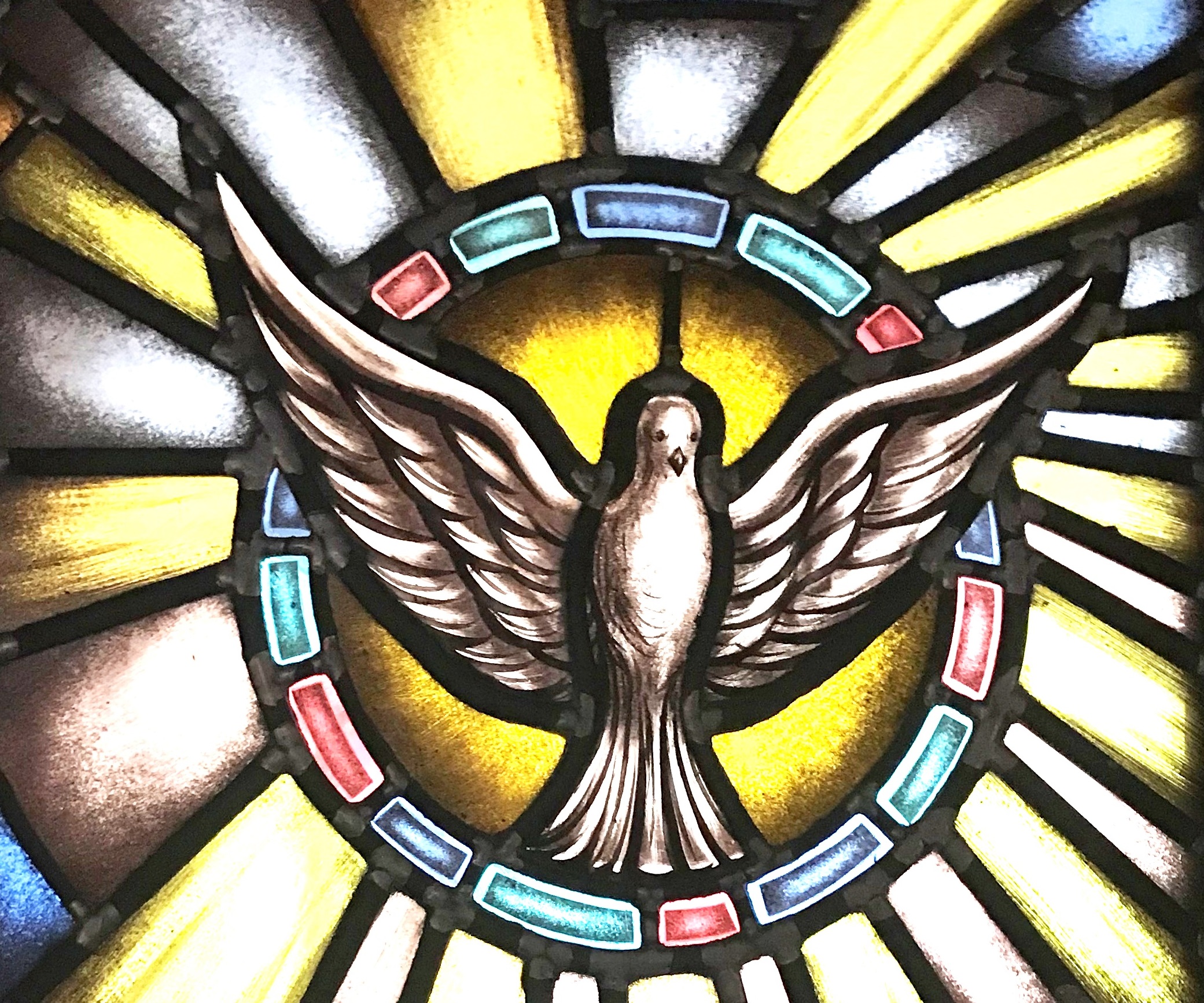- About Sacraments
- Baptisms
- Reconciliation
- Eucharist
- Confirmation
- Anointing of the Sick
- Marriage
- Holy Orders
- Interested in becoming Catholic?
Sacraments
The Latin word, sacramentum, means “a sign of the sacred.”
In the Catholic Church we have seven sacraments that point to what is sacred, significant and important for Christians. Sacraments are special occasions for experiencing God’s saving presence.
Each sacrament has its own rite that is performed to convey God’s grace to the recipient, through the power of the Holy Spirit.
“Christ instituted the sacraments of the new law. There are seven: Baptism, Confirmation, the Eucharist, Penance/Reconciliation, the Anointing of the Sick, Holy Orders and Matrimony. The seven sacraments touch all the stages and all the important moments of Christian life: they give birth and increase, healing and mission to the Christian's life of faith. There is thus a certain resemblance between the stages of natural life and the stages of the spiritual life (Catechism of the Catholic Church, 1210).”

Baptism
Baptism frequently called the "first sacrament" the gateway to the rest of the sacraments is one of the Seven Sacraments of the Catholic Church. Through Baptism we are freed from the original sin and we are reborn as children of God. We also become members of the mystical body of Christ, which means that we are incorporated into the Church and made sharers in the Church’s mission.
The Catechism of the Catholic Church says, “Baptism is necessary for salvation for those to whom the Gospel has been proclaimed and who have had the possibility of asking for this sacrament. The Church does not know of any means other than Baptism that assures entry into eternal beatitude; this is why she takes care not to neglect the mission she has received from the Lord to see that all who can be baptized are ‘reborn of water and the Spirit’ (CCC 1257).”
Baptism was instituted by Christ: “All power is given to Me in heaven and earth. Going, therefore, teach all nations, baptizing them in the name of the Father and of the Son and of the Holy Spirit (Mt. 28:18-20)."
Some of the Frequently Asked Questions
1. Who may baptize?
The ordinary minister of Baptism is a bishop, priest, or deacon. In the case of an emergency, any person may baptize, even if not baptized him/herself. This person must intend what the Church intends, and baptize the child with water, using the Trinitarian formula: "I baptize you in the name of the Father, and of the Son and of the Holy Spirit."
2. Can our child be baptized if we're not practicing Catholics?
Baptism is more than a rite of passage for a child or a washing away of original sin. Baptism is sharing in the life of the risen Christ. Baptism is also the first step of initiation into the Christian community. During the Rite of Baptism, parents promise to raise their child in the practice of the Catholic faith; therefore, parents who are not practicing members of the community may be asked to delay the Baptism of their child until they themselves have re-established that connection with their parish community.
3. Can our child be baptized if we're not married?
Your child's Baptism and your marriage are two separate issues. Your marital status may be discussed during your Baptism interview to encourage you to get married (or validate your marriage in the Church) if this is appropriate. However, as long as you are committed to raising your child as a Catholic, he/she may celebrate the Sacrament of Baptism and be welcomed into the Catholic Church.
4. Who can be godparents?
Since godparents take on two roles - that of support for the parents in the Catholic upbringing of their child, and that of representing the Christian community into which the child is being initiated - they must be practicing Catholics, living according to the faith and fully initiated through the Sacraments of Baptism, Confirmation, and Eucharist, who are mature enough (usually at least 16 years of age) to undertake this role. (Code of Canon Law, c. 872)
A godparent does not need to be of the same gender as the candidate for Baptism. The godparent assumes no legal responsibility for the child.
5. Can a parent serve as a godparent?
A parent may not serve as a godparent because the parent already has a distinct role and relationship with the child. Parents are the first and primary caretakers and educators of the child. A godparent's role is separate from that of a parent or legal guardian.
6. What if the person I have chosen as a godparent is sick or unable to be present at the time of the Baptism?
In exceptional circumstances, it is possible for the godparent to be represented at the Baptism by a 'proxy'. The names of the godparent and his/her proxy will be entered in the Baptismal Register. The name of the person who has served as a proxy is not included on the Baptismal Certificate.
7. Does our child have to be baptized in order to attend a Catholic school?
It is important to check with the school board that has jurisdiction where your child will attend school. The trustees of each board interpret the admission requirements in their own way. Some school boards require proof of a parent's Catholic Baptism, especially if the child has not been baptized.
Baptism is never to be seen as a means to enroll in a Catholic school.
Reconciliation
The sacrament of Reconciliation (also known as ‘confession’) brings about a true ‘spiritual resurrection,’ the restoration of the dignity and blessings of the life of the children of God, of which the most precious is friendship with God (Catechism of the Catholic Church # 1468). Therefore, it is a special encounter with Jesus Christ, a great source of grace.
The Church recommends monthly confession as a spiritual discipline. At a minimum, Catholics must make a confession of sins when they are conscious of mortal sin before the reception of Holy Communion. Also, the precept of the Church says that Catholics ought to confess their sins in the sacrament of Confession at least once a year during the Easter Season.
Confession times at each respective parish are listed on the Home page.
Children, who are baptized in the Catholic Church, may start their preparation for their 1st Reconciliation when they enter the 2nd grade of elementary school.
Registration the 2024-2025 school year is now closed.

Eucharist
The Holy Eucharist is a sacrament instituted by Jesus.
The mode of Christ's presence under the Eucharistic species is unique. It raises the Eucharist above all the sacraments as "the perfection of the spiritual life and the end to which all the sacraments tend." In the most blessed sacrament of the Eucharist, "the body and blood, together with the soul and divinity, of our Lord Jesus Christ and, therefore, the whole Christ is truly, really, and substantially contained." (Catechism of the Catholic Church #1374)
The Sacrament of Eucharist celebrates the reception of Jesus Christ, our Risen Lord, who seeks to dwell in our hearts. The regular reception of this sacrament strengthens our bond with Christ and the Christian community.
Children in grade 2 (or above), who are baptized in the Catholic Faith, are entered into a special formation session that prepares them to receive the sacrament of Eucharist (Holy Communion). When the sacrament is received for the 1st time, we refer to it as the First Holy Communion celebration.
Registration the 2024-2025 school year is now closed.
Confirmation
The sacrament of Confirmation completes the graces and the Blessings of the Holy Spirit received at Baptism. Through Confirmation, we are strengthened anew by the Spirit, so that we can live out the Christian life more fully.
The typical time for parishioners to receive the Sacrament of Confirmation is in Grade 8. Yet the preparation program itself is open to anyone above grade 8, who has already been baptized in the Church, and who has received his or her First Reconciliation and First Communion.
Registration the 2024-2025 school year is now closed
The Anointing of the Sick
Priests and bishops are the ministers of this sacrament. Through the laying on of hands and anointing with blessed oil, the sacrament is administered to the sick to bring spiritual and even physical strength during an illness. The Sacrament of Reconciliation may accompany this sacrament of the anointing of the sick.
“The anointing of the sick conveys several graces and imparts gifts of strengthening in the Holy Spirit against anxiety, discouragement, and temptation, and conveys peace and fortitude (Catechism of the Catholic Church # 1520).”
“The special grace of the Sacrament of the Anointing of the Sick has as its effects: the uniting of the sick person to the passion of Christ, for his own good and that of the whole Church; the strengthening, peace, and courage to endure in a Christian manner the sufferings of illness or old age; the forgiveness of sins, if the sick person was not able to obtain it through the sacrament of penance; the restoration of health, if it is conducive to the salvation of his soul; the preparation for passing over to eternal life (Catechism of the Catholic Church #1532).”
To receive this sacrament please contact one of our priests:
Fr. Waclaw Chudy, wchudy@dol.ca
Fr. Adam Gabriel, agabriel@dol.ca
Fr. Jerzy Mogielski giorgiom@dol.ca

Marriage

Marriage is the only sacrament in which the minister is not an ordained minister, but the spouses themselves, at the moment when they exchange consent before God, the Church, and the community.
The priest accepts their consent and gives the Church’s blessing.
The Catechism of the Catholic Church defines marriage as, “The matrimonial covenant, by which a man and a woman establish between themselves a partnership of the whole of life, is by its nature ordered toward the good of the spouses and the procreation and education of offspring; this covenant between baptized persons has been raised by Christ the Lord to the dignity of a sacrament” (#1601).
Therefore; a valid celebration of matrimony creates a perpetual and exclusive bond between the spouses. The exclusive union of one man and one woman is a “natural law” written in human nature by the Creator from the beginning, and common to humankind at every time, in every people and culture.
Holy Orders
The Sacrament of Holy Orders is the sacrament through which the mission entrusted by Christ to his apostles, continues to be exercised in the Church until the end of time. This is a sacrament of apostolic ministry. It includes three degrees: episcopate (bishop), presbyterate (priest), and diaconate (deacon).
All Christians participate in the one priesthood of Christ. The whole community of believers is, as such, priestly called to it through the sacraments of Baptism. Those who, after being baptized, receive the Sacrament of Holy Orders, also become part of the ministerial or hierarchical priesthood. The ministerial priesthood is at the service of the common priesthood of all the baptized. It is intended to unfold the baptismal grace of all Christians. The ministerial priesthood is the means by which Christ continues to build up and lead his Church.
If you feel you may be called to the priesthood, please contact the Diocesan Vocations Office at vocations@dol.ca or contact your parish priest.

OCIA

For adults (and children over the age of 7) wishing to receive the Sacraments of Initiation (Baptism, Confirmation or First Communion), preparation is provided through the O.C.I.A. formation program.
OCIA: The Order of Christian Initiation of Adults is the process by which adults (or children of catechetical age 7 or above) are received into the Catholic Church after a period of instruction that includes community involvement and rites. The final celebration of the Sacraments of Initiation (Baptism, Confirmation and First Eucharist) normally occurs at the Easter vigil Mass.
